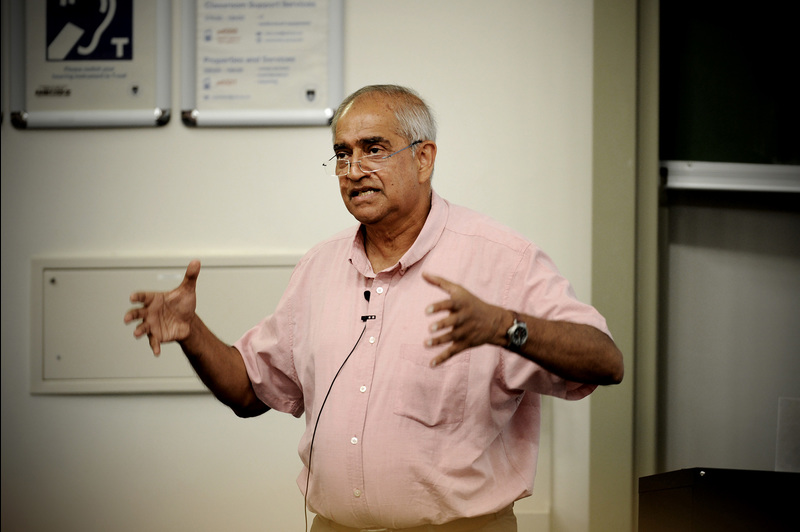Fallist movement like déjà vu
13 January 2020 | Story Niémah Davids. Photo Lerato Maduna. Read time 4 min.
For Emeritus Professor Anwar Mall, former acting Deputy Vice-Chancellor (DVC) for Transformation and Student Affairs at the University of Cape Town (UCT), the #RhodesMustFall and #FeesMustFall protests of 2015/16 brought back bleak memories of a time gone by.
He was presenting the fifth and final Summer School lecture on the “five crises in UCT’s history” on Friday, 10 January. The topic of his presentation – “The Fallist movement: a personal perspective” – explored Mall’s almost three decades at UCT and included his role as a residence warden in the 1980s.
The retired academic explained that his tenure as DVC came towards the end of his career at UCT and kicked off during what has been described as a tumultuous time in the institution’s history – the #RhodesMustFall and #FeesMustFall movements.
Addressing the audience, Mall asked: “Have our efforts since the late 1980s failed to integrate black students into UCT for them to flourish academically, emotionally and socially?”
Pot-banging protest
When Mall became one of two wardens at Liesbeeck Gardens (a university residence off Liesbeeck Parkway) in the 1980s, he was unprepared for the mammoth task that awaited him.
“Being a warden is a part-time job, but you eventually learn that it’s actually a full-time job,” he said. “We were meant to look after the emotional, social and psychological welfare of students in our residences.”
And students were far from happy.
They complained about non-existent facilities at the residence, including the lack of a laundry, a common room and other recreational facilities. He said students at the time criticised UCT, saying the institution placed them “in the ghetto”, separated from white students in “their comfortable, well-run, well-established” residences.
“They came to my flat [in the building], stood outside and banged pots all night long.”
When university authorities decided to take away the lounge area in each flat to make way for another bedroom to create additional space for incoming students, it was the last straw.
It was then, according to Mall, that students mobilised and participated in a protest of a different kind – the pot-banging protest, banging pots to demonstrate their anger.
“They came to my flat [in the building], stood outside and banged pots all night long. This was my first experience of a residence protest,” he said.
The irony
Fast forward almost three decades later to the Fallist movements, and Mall said he felt like he was experiencing déjà vu.
“It’s ironic because the 2015/16 protests also focused a lot on residence life.”
He told the audience that during the 2015/16 protests, the students’ grievances were similarly with university authorities, who were perceived as being insensitive to black students because of the number of foreigners in UCT residences.
“We explained that [a] university is a place for the meeting of minds, and you cannot have a homogenous group in a university and not expose yourself to ideas of the outside world,” he said.
“I was amazed that the grievances of the students were much the same almost three decades ago.”
The issue of why UCT allowed white students from the southern suburbs to occupy residences also came under the microscope.
“I was amazed that the grievances of the students were much the same almost three decades ago. Had nothing changed in the interim?” he asked. “These [new] protests reminded us that while much has changed, things seemed to be still the same or worse for many.”
Mall said he remains grateful for the “wake-up call” the Fallist movements continue to bring to South African universities.
“But one of our biggest challenges [from] both sides is to learn how to communicate robustly and respectfully,” he said.
 This work is licensed under a Creative Commons Attribution-NoDerivatives 4.0 International License.
This work is licensed under a Creative Commons Attribution-NoDerivatives 4.0 International License.
Please view the republishing articles page for more information.










